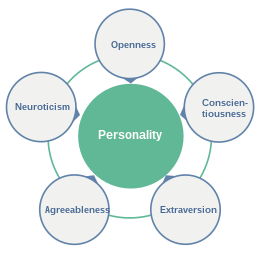Psychologists broadly divide personality into five dimensions, commonly called the Big 5 Traits of Personality. The theory we will discuss today in this blog talks about these five dimensions, namely,
- Openness
- Agreeableness
- Extroversion
- Conscientiousness
- Neuroticism
Several theories contain extensive research about the various traits of human behavior. The initial theories suggest the possibility of numerous characteristics, including Gordon Allport’s 4000-character traits, Hans Eysenck’s three theory, and 16 traits by Raymond Cattell.
These theories were eventually discarded for limited scope and complications. However, the popularity and significant acceptance of the Big 5 theory are owing to its easy-to-understand concept and inclusion of the essentials in solid blocks.
History of The Big 5 Theory of Personality
Modern-day researchers have widely accepted the Big 5 theory. However, the beginning dates back to 1949 with D.W. Fiske’s extensive studies on personality. The other notable names are Norman and Smith (1967), Goldberg (1981), and McCrae Costa (1987).
Psychologists do not always align precisely to the labels of all the dimensions; however, literature has always shown a keen alignment to this fantastic theory.
Let us discuss each of the Big 5 personality traits in greater detail. This blog shall help you prepare for a psychometric test by helping you identify your inner persona with more clarity.
Big 5: O.C.E.A.N.
Every trait depicts a range between 2 extreme characteristics. Take the example of extraversion. There is a huge difference between extreme introversion and extreme extraversion.
In reality, no one belongs to either end. As a result, people tend to stay between the two poles of each dimension.
- Openness
This attribute is the zone for insight, intuition, and imagination. If you rank at the higher end in this trait, you probably are interested in multiple things. However, people who dominate this strait also tend to be wilful learners, a sucker for new experiences, and perhaps interested in everything on the planet.
Since such people are more creative and adventurous, choosing a profession that demands out-of-the-box ideas can be an excellent fit for them. Several amazing personality tests on the internet can help you know if you are one of them!
If you rank low in this trait, you are more traditional, not open to changes, and lack abstract ideas.
- Conscientiousness
Conscientiousness includes the subtle features of a non-impulsive persona, thoughtfulness, and objective-oriented rational behaviour.
People on the higher end of this trait observe things with minute detail and are pretty organized mindful. They are good planners who can foresee and analyze situations in advance.
They think about reacting so that people around them are not adversely affected and tend to stick to the deadline almost all the time.
Take a profile test to find out if you are one of them!
- Extraversion
These people brighten up every room and are blessed and special ones, envied by all the socially anxious introverts.
Extroversion or extraversion is a trait full of excitement, sociability, assertive behaviour, talkativeness, and highly extroverted, expressive.
The opposite of this pole is the pole of introverts. Introverted people tend to be socially reserved and find it difficult to place themselves comfortably in social settings. They prefer solitude and can only be energized with peace and a lonesome setting.
- Agreeableness
Agreeable people are the kind souls who can please the entire room with their humbleness. People on the higher end of the agreeable pole tend to have prosocial behavioural traits like altruism, loving, affection, kindness, and trust.
They are often seen to be cooperating under challenging situations and compromise if needed. On the other hand, people who are not agreeable can be competitive and to some extent, manipulative. They tend not to care about how others feel or others’ perceptions and can sometimes be rude to people.
Suppose the personality test results for entrepreneur shows a lower amount of agreeableness. In that case, such people cannot be good managers and will create conflict in the organization.
- Neuroticism
People who are highly neurotic must practice emotional regulation and seek professional help in some cases.
The last trait of the Big 5 is marked with emotional instability, sadness, and indecisiveness. People on the higher end of this pole predominantly suffer from mood disorders, anxiety, and sometimes depression.
Emotionally resilient people who can manage stress well and control their nerves tend to rank lower on this ladder.
Summing Up
A person’s behaviour directly influences two factors; their personality trait and circumstance. Personality is a complex field of study in psychology. Usually, the characteristic features occur in groups among people. However, someone can be talkative yet unsociable.
Boxing yourselves in categories can never be wise. Instead, identify your core issues, and embrace yourself with confidence. Please share with us which category you identified the most with!










